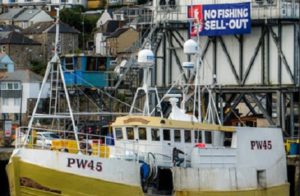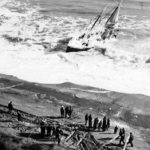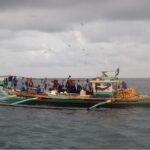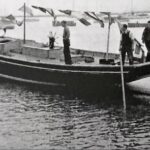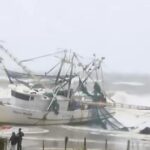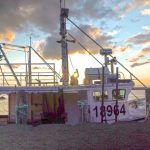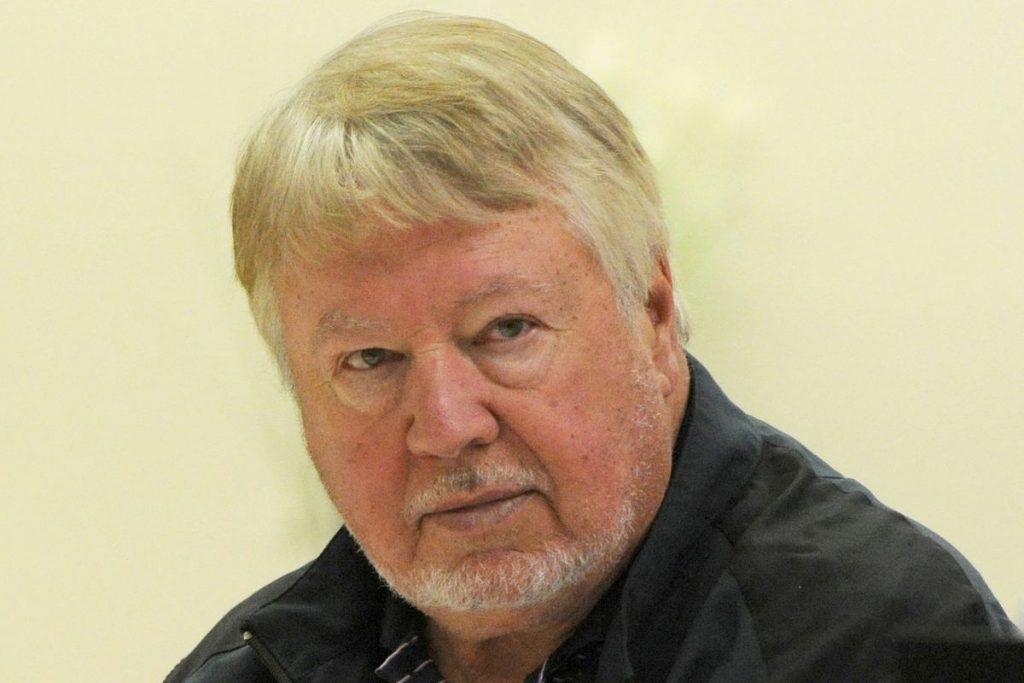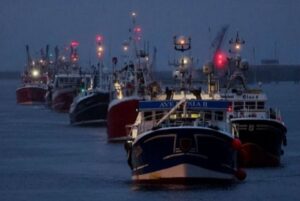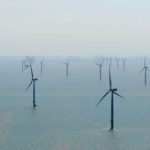Tag Archives: Pacific Fisheries Management Council
California’s ocean salmon fishing season closed for second year in a row
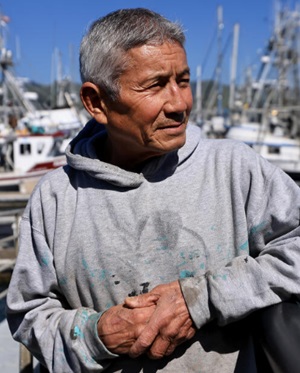 California’s commercial and recreational ocean salmon fishing season is set to be closed for the second consecutive year, another blow to the state’s beleaguered industry suffering from the combined fallout of drought, climate disruption and deteriorating ocean conditions. Already, a new request is underway for yet another federal disaster declaration to help alleviate some of the wide economic damage from the closure, affecting not just the fleet but many associated businesses that depend on the fishery, one of the state’s most lucrative. Many fishermen, already resigned to a severely limited season if any at all due to depleted stocks, had backed the full closure. “For nine months now, we’ll probably be without income. When you look at overall impact, it’s significant. Do we want the closure? Obviously, no. Is it necessary? Yes,” said Dick Ogg, a Bodega Bay commercial fisherman and president of the Bodega Bay Fishermen’s Marketing Association. Photos, more, >>click to read<< 07:43
California’s commercial and recreational ocean salmon fishing season is set to be closed for the second consecutive year, another blow to the state’s beleaguered industry suffering from the combined fallout of drought, climate disruption and deteriorating ocean conditions. Already, a new request is underway for yet another federal disaster declaration to help alleviate some of the wide economic damage from the closure, affecting not just the fleet but many associated businesses that depend on the fishery, one of the state’s most lucrative. Many fishermen, already resigned to a severely limited season if any at all due to depleted stocks, had backed the full closure. “For nine months now, we’ll probably be without income. When you look at overall impact, it’s significant. Do we want the closure? Obviously, no. Is it necessary? Yes,” said Dick Ogg, a Bodega Bay commercial fisherman and president of the Bodega Bay Fishermen’s Marketing Association. Photos, more, >>click to read<< 07:43
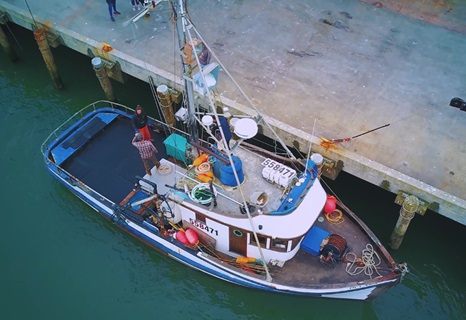
Reopening Areas for Groundfish Fishing After 20 Years
NOAA Fisheries has published regulation changes that will open fishing areas that have been closed for over 20 years. These areas were originally closed in the early 2000s to protect several species of overfished rockfish. With the rebuilt status of almost all these groundfish species, these closures can slowly be opened and allow fishermen greater access to catch healthy fish stocks. The regulations will also close some small areas to protect groundfish habitat, yelloweye rockfish (a species that is still rebuilding), and sensitive areas with abundant coral. These regulation changes are effective on January 1, 2024. Groundfish on the West Coast encompass over 90 species sharing one important trait: at some point in their life, they live on or near the ocean floor. Groundfish are a crucial part of West Coast underwater environments. They act as both predator and prey to different species and help maintain balance in underwater food chains. photos, charts, info, >>click to read<< 11:10
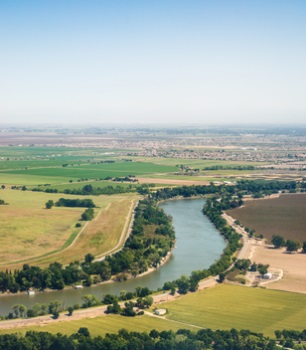
Salmon fishermen reflect on causes, future as closure looms
Earlier this year, Governor Gavin Newsom signed an executive order urging California’s water board to waive environmental laws and reserve water for future agricultural use, that would otherwise be released to help insure the survival of native fish and wildlife species. “The politics of water mismanagement readily and consistently traverses party lines,” Davis said. “So we’re trying to get equitable allocation of the resource to the different sectors, agricultural, residential, and environmental, which supports the salmon.” Tim Obert, a salmon fisherman based out of Santa Cruz, said the ramifications of the closure could be devastating. >click to read< 10:16
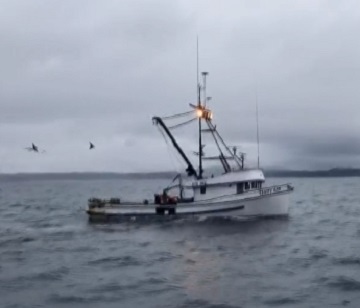
Imperiled Chinook salmon runs close ocean fishing off California, much of Oregon
The closure currently runs through May 15 and affects a length of the coast stretching from Oregon’s Cape Falcon, near Cannon Beach, south to the Mexican border. And it could be extended, officials said, as the imperiled species struggles amid a long-running drought. Further closures are likely, said Eric Schindler, head of the Oregon Department of Wildlife’s Ocean Salmon Program.“It doesn’t look good for this year or next year, and possibly the year after that, because of the drought conditions in California,” Schindler said. “We have to make sure that we’re not undermining our ability to produce salmon for the next go around.” Video, >click to read< 10:35
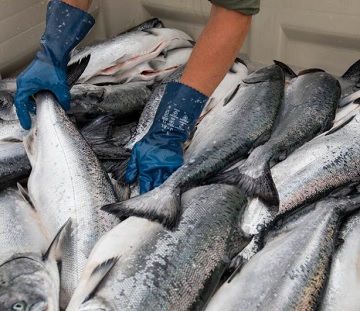
Poor outlook for king salmon could shut down California’s sport and commercial seasons
This year’s official “forecast abundance” estimates that just 169,767 adult chinook salmon are waiting off shore to be caught — a substantial decrease from the 396,458 predicted last year and forecasts above 800,000 a decade ago. A nearly 2-month delay in the Dungeness crab season this year meant commercial crabbers missed the Thanksgiving, Christmas and New Year’s holidays and then had a glut of fresh crab available when the market was weak, said veteran fisherman Dick Ogg, vice president of the Bodega Bay Fisherman’s Marketing Association, which represents the local commercial fleet. Though Ogg participates in a variety of fisheries, many locals only do salmon, crab or both. “For the guys that only have salmon as a potential income, it’s going to be devastating,” he said, “and for the guys who have salmon and crab, and who have had a minimal crab season, it’s going to be devastating.” >click to read< 09:05
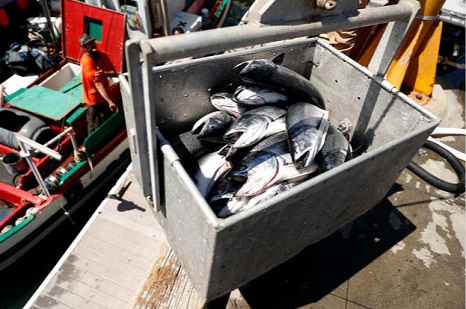
Choppy Weather and Fishing Limits gets California salmon season off to slow, expensive start
Commercial fishing boats may only fish south from Pigeon Point on the San Mateo coast, instead of in the typical area open all the way to Mendocino County this time of year. Strict limits on this year’s salmon season were set by the Pacific Fisheries Management Council in consideration of what’s expected to be a smaller population of adult king, or chinook, salmon in the ocean this year. The geographic limitations and conditions are keeping local fishing boats in Monterey Bay for now, but some of the fish are making their way to the Bay Area. Sarah Bates came down to Monterey Bay from San Francisco with a crew member on her boat, F/V Bounty. “Everybody is in the bay because it’s the only place to hide from the afternoon wind,” The limited season means they don’t have much of a choice, Bates said. “We feel pressure to fish in bad weather where there’s so few days,” she said. “We’re pretty much going to go fishing no matter what.” photos, >click to read< 21:09
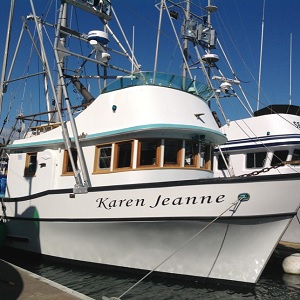
California salmon season delayed and shortened, angering North Bay fishermen. Closest start may be May 1
Expected to be decided within the next few weeks, there are three proposals on the table, all shorten the season considerably. The closest start may be May 1, instead of April. Association President John McManus predicted a 40% loss in the season for sports fishermen, while Crescent City commercial fisherman George Bradshaw predicted the industry’s take would be down by two thirds. The bad news for a delayed and restricted salmon fishing season comes on the heels of a slow, sputtering start for crab fishing fleets, which were stalled while fishery officials waited for migrating whales to leave the coastal region. >click to read< 08:05
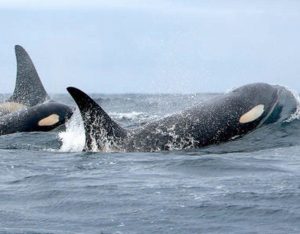
Salmon Fisheries Set As Managers Start Process To Protect Endangered Orcas
The organization that sets limits for commercial, recreational and tribal salmon fisheries in the Pacific Northwest wrapped up their work Tuesday at a meeting in Northern California. The Pacific Fisheries Management Council bases the limits on salmon run projections up and down the coast. While the chinook salmon catch will be slightly lower than last year, the coho fishery in Washington and northern Oregon will be much improved. Recreational anglers would benefit most from this. In addition, the council is starting work on plans to rebuild five Northwest fish runs considered to be “overfished,”,,, >click to read< 09:07
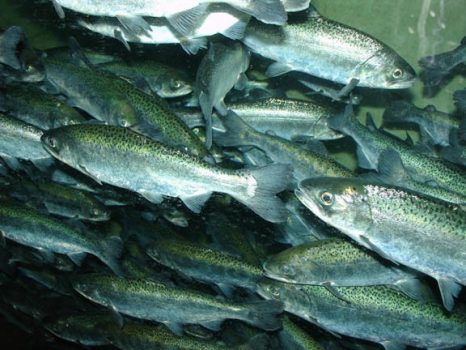
In ‘Crisis,’ Yuroks Suspend Commercial Salmon Season
For the second year in a row, the Yurok Tribe will not have a commercial fishery — a devastating blow to the tribe’s culture and economy. “We are in crisis mode,” said Yurok Tribal Chair Thomas O’Rourke in a press release that lamented poor conditions on the Klamath River that have led to historically low salmon returns. “The Klamath is our grocery store, our church and our main highway. It’s our lifeline. We will leave no stone unturned in search of additional short-term and long-term solutions to address the most terrible fisheries disaster in the Tribe’s history.” The release comes after the Pacific Fisheries Management Council released its predicted Chinook salmon returns for 2017 at 11,000 fish — the lowest on record — and the tribe’s fish harvest allocation at 650 fish, or one for every 10 tribal members. The predicted return comes after two years of disease outbreaks in juvenile fish due to low flows and elevated water temperatures in the Klamath River. continue reading the story here 13:44
Pacific Fisheries Management Council Nominated for ‘Shark Enemy’ Award!
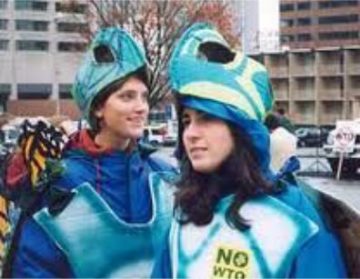 This week Turtle Island Restoration Network, a leading international marine conservation organization, and fellow environmentalists officially nominated the Pacific Fisheries Management Council (PFMC) for the ‘Shark Enemy’ award by the conservation organization Sharkproject International. The PFMC was nominated for this dishonor based on the council’s anti-shark-conservation policies, most notably their decisions to continue to allow the California drift gillnet fishery to target the common thesher shark, and harm, kill and further endanger thousands of sharks. In a ten-year period ending in 2014, this the fishery caught a staggering 26,217 sharks. For over a decade, the PFMC has failed to reduce the fishery’s catastrophic bycatch of sharks to a reasonable level. (what quackery!) Read the rest here 10:52
This week Turtle Island Restoration Network, a leading international marine conservation organization, and fellow environmentalists officially nominated the Pacific Fisheries Management Council (PFMC) for the ‘Shark Enemy’ award by the conservation organization Sharkproject International. The PFMC was nominated for this dishonor based on the council’s anti-shark-conservation policies, most notably their decisions to continue to allow the California drift gillnet fishery to target the common thesher shark, and harm, kill and further endanger thousands of sharks. In a ten-year period ending in 2014, this the fishery caught a staggering 26,217 sharks. For over a decade, the PFMC has failed to reduce the fishery’s catastrophic bycatch of sharks to a reasonable level. (what quackery!) Read the rest here 10:52
Pacific Council approves three West Coast commercial fishing fleets for electronic monitoring
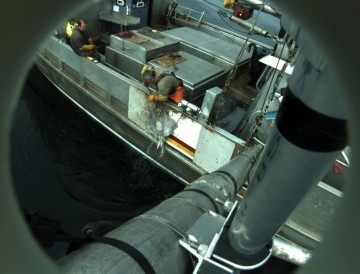 As of 2017, the , and mothership catcher vessel fleets will no longer be required to carry human observers on fishing trips, helping to simplify logistics, reduce costs and increase profits for fishermen. Heather Mann, executive director of the Midwater Trawler’s Cooperative, an Oregon-based organization representing 18 whiting vessels, said: “What this decision does is transfer responsibility for catch accounting from the federal government to vessel operators, where it should be.” Read the rest here 17:24
As of 2017, the , and mothership catcher vessel fleets will no longer be required to carry human observers on fishing trips, helping to simplify logistics, reduce costs and increase profits for fishermen. Heather Mann, executive director of the Midwater Trawler’s Cooperative, an Oregon-based organization representing 18 whiting vessels, said: “What this decision does is transfer responsibility for catch accounting from the federal government to vessel operators, where it should be.” Read the rest here 17:24
Devastated salmon population likely to result in fishing restrictions
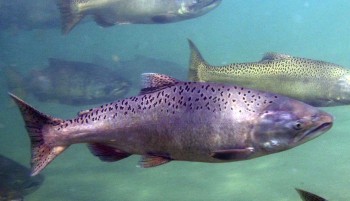 Northern California’s commercial anglers are bracing for restrictions on the upcoming salmon-fishing season after federal regulators projected there are half as many in the ocean compared to this time last year. Last week, the Pacific Fisheries Management Council released its annual population estimates for Chinook off the Pacific Coast. The council estimates about 300,000 adult fall-run salmon from the Sacramento River system are swimming off the coast this year. For the past several years, the forecasts have predicted more than 600,000 salmon. “It’s a 1-2-3 punch,” said Tim Sloane, executive director of the Pacific Coast Federation of Fishermen’s Associations. Read the rest here 21:43
Northern California’s commercial anglers are bracing for restrictions on the upcoming salmon-fishing season after federal regulators projected there are half as many in the ocean compared to this time last year. Last week, the Pacific Fisheries Management Council released its annual population estimates for Chinook off the Pacific Coast. The council estimates about 300,000 adult fall-run salmon from the Sacramento River system are swimming off the coast this year. For the past several years, the forecasts have predicted more than 600,000 salmon. “It’s a 1-2-3 punch,” said Tim Sloane, executive director of the Pacific Coast Federation of Fishermen’s Associations. Read the rest here 21:43
California’s bluefin tuna drowning in a sea of politics
 California should shut down its Pacific bluefin tuna fishery. That’s something conservationists have been demanding for years, citing evidence of severe overfishing,,, federal rules and interagency politics are getting in the way of smart fishery management. “I don’t think we have any choice but to adopt our rules in conformance with what the federal council recommended,” Sutton said of the recommendation from the Pacific Fisheries Management Council, the industry-dominated (?) regional advisory body,,, Read the rest here 10:36
California should shut down its Pacific bluefin tuna fishery. That’s something conservationists have been demanding for years, citing evidence of severe overfishing,,, federal rules and interagency politics are getting in the way of smart fishery management. “I don’t think we have any choice but to adopt our rules in conformance with what the federal council recommended,” Sutton said of the recommendation from the Pacific Fisheries Management Council, the industry-dominated (?) regional advisory body,,, Read the rest here 10:36
California salmon outlook is good for 2015, ominous in the long run
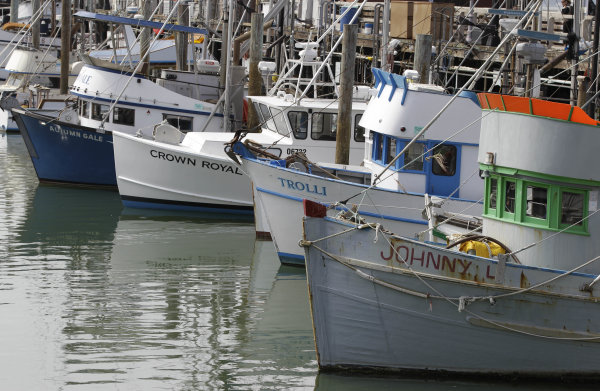 Reflecting optimism about this year’s abundance of chinook salmon, fishing industry regulators on Wednesday approved the longest commercial season in more than a decade. But the state’s record drought has darkened the long-term outlook for one of California’s most valuable fish. “I am feeling pretty good about this year,” said Pillar Point fisherman Don Marshall, who represents a group of roughly 75 small boat operators throughout California. “I think there are some fish around.” Read the rest here 19:38
Reflecting optimism about this year’s abundance of chinook salmon, fishing industry regulators on Wednesday approved the longest commercial season in more than a decade. But the state’s record drought has darkened the long-term outlook for one of California’s most valuable fish. “I am feeling pretty good about this year,” said Pillar Point fisherman Don Marshall, who represents a group of roughly 75 small boat operators throughout California. “I think there are some fish around.” Read the rest here 19:38
Despite drought, Bay Area salmon fishermen see hope for 2015 season
 Bay Area commercial salmon fisherman got a jolt of good news this week in the form of population data that could bode well for the upcoming season. The Pacific Fisheries Management Council released estimates for the number of chinook salmon that returned from the Pacific Ocean in the fall to spawn in rivers where they were born or released from hatcheries. The estimate for the Sacramento River, the top spawning ground in California, was relatively robust, considering the state’s three-year drought. Read the rest here 19:03
Bay Area commercial salmon fisherman got a jolt of good news this week in the form of population data that could bode well for the upcoming season. The Pacific Fisheries Management Council released estimates for the number of chinook salmon that returned from the Pacific Ocean in the fall to spawn in rivers where they were born or released from hatcheries. The estimate for the Sacramento River, the top spawning ground in California, was relatively robust, considering the state’s three-year drought. Read the rest here 19:03
Democrat Lawmakers & Conservation Groups Call for Phase Out of California Drift Gillnets
 Sacramento (Dec. 22, 2014) – With the full support of Turtle Island Restoration Network, OCEANA and other marine conservations organizations, California Assemblymember Marc Levine (D-San Rafael) and Assemblymember Mark Stone (D-Monterey Bay), Assemblymember Das Williams (D-Santa Barbara), Assemblymember Richard Bloom (D-Santa Monica), Senator Bill Monning (D-Carmel) today called on the Pacific Fisheries Management Council and the National Oceanic and Atmospheric Administration Fisheries Service to transition away from deadly California drift gillnets. Read the rest here 22:13
Sacramento (Dec. 22, 2014) – With the full support of Turtle Island Restoration Network, OCEANA and other marine conservations organizations, California Assemblymember Marc Levine (D-San Rafael) and Assemblymember Mark Stone (D-Monterey Bay), Assemblymember Das Williams (D-Santa Barbara), Assemblymember Richard Bloom (D-Santa Monica), Senator Bill Monning (D-Carmel) today called on the Pacific Fisheries Management Council and the National Oceanic and Atmospheric Administration Fisheries Service to transition away from deadly California drift gillnets. Read the rest here 22:13
Pacific Fisheries Management Council try fix for persistently inaccurate forecasting methods
Over the past decade the numbers of fall run Sacramento River Chinook salmon predicted to return by the Pacific Fisheries Management Council (PFMC) have been overestimated, sometimes wildly so. Those numbers are used to determine the timing of fishing seasons and how many fish commercial and sports fishers are allowed to take. Read more here 07:58
The Oregon Fish and Wildlife Commission affirms ocean salmon, halibut seasons
 The News Guard – SALEM – The Oregon Fish and Wildlife Commission at its meeting today made official the 2013 ocean salmon and Pacific halilbut seasons, including several fisheries that opened earlier in this month under temporary rules. The Commission adopted regulations for ocean coho and chinook salmon fishing in Oregon’s territorial waters that are in line with the seasons set by Pacific Fisheries Management Council in April for ocean waters beyond three miles. continued
The News Guard – SALEM – The Oregon Fish and Wildlife Commission at its meeting today made official the 2013 ocean salmon and Pacific halilbut seasons, including several fisheries that opened earlier in this month under temporary rules. The Commission adopted regulations for ocean coho and chinook salmon fishing in Oregon’s territorial waters that are in line with the seasons set by Pacific Fisheries Management Council in April for ocean waters beyond three miles. continued
Klamath Flows Dropped Without Endangered Species Agency Approval by Hoopa Valley Tribe
Fish supporters say science is being compromised, salmon run will suffer – Klamath Falls, Oregon –Just days before the Pacific Fisheries Management Council announced the Klamath River will have another healthy run of salmon this year, the Bureau of Reclamation (BOR) Klamath Basin Area Office announced a new water plan for the Klamath before receiving approval from the regulatory agency (NOAA fisheries) that regulates flows for endangered fisheries. The BOR expects approval for a controversial water plan that reduces water for salmon even though flows had to be supplemented with Trinity River flows last year to keep salmon alive. continued
The Pacific Fisheries Management Council seek public comment on proposed North Coast salmon season
![]() Regional wildlife officials are seeking public comment on the proposed salmon fishing season for both commercial and recreational fishermen. The Pacific Fisheries Management Council laid out a detailed series of alternatives at a meeting Monday. Council members will hold a public hearing to collect comments in Eureka on March 26. They will meet in Portland, Ore., from April 6-11 to discuss and set the final rules. continued
Regional wildlife officials are seeking public comment on the proposed salmon fishing season for both commercial and recreational fishermen. The Pacific Fisheries Management Council laid out a detailed series of alternatives at a meeting Monday. Council members will hold a public hearing to collect comments in Eureka on March 26. They will meet in Portland, Ore., from April 6-11 to discuss and set the final rules. continued

































